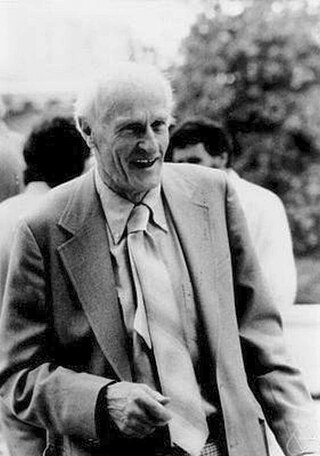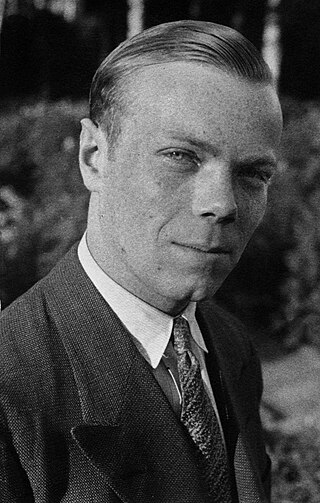Related Research Articles
In computability theory, the Church–Turing thesis is a thesis about the nature of computable functions. It states that a function on the natural numbers can be calculated by an effective method if and only if it is computable by a Turing machine. The thesis is named after American mathematician Alonzo Church and the British mathematician Alan Turing. Before the precise definition of computable function, mathematicians often used the informal term effectively calculable to describe functions that are computable by paper-and-pencil methods. In the 1930s, several independent attempts were made to formalize the notion of computability:
In logic, the law of excluded middle or the principle of excluded middle states that for every proposition, either this proposition or its negation is true. It is one of the three laws of thought, along with the law of noncontradiction, and the law of identity; however, no system of logic is built on just these laws, and none of these laws provides inference rules, such as modus ponens or De Morgan's laws. The law is also known as the law / principleof the excluded third, in Latin principium tertii exclusi. Another Latin designation for this law is tertium non datur or "no third [possibility] is given". In classical logic, the law is a tautology.
In the philosophy of mathematics, intuitionism, or neointuitionism, is an approach where mathematics is considered to be purely the result of the constructive mental activity of humans rather than the discovery of fundamental principles claimed to exist in an objective reality. That is, logic and mathematics are not considered analytic activities wherein deep properties of objective reality are revealed and applied, but are instead considered the application of internally consistent methods used to realize more complex mental constructs, regardless of their possible independent existence in an objective reality.
Mathematical logic is the study of formal logic within mathematics. Major subareas include model theory, proof theory, set theory, and recursion theory. Research in mathematical logic commonly addresses the mathematical properties of formal systems of logic such as their expressive or deductive power. However, it can also include uses of logic to characterize correct mathematical reasoning or to establish foundations of mathematics.

Stephen Cole Kleene was an American mathematician. One of the students of Alonzo Church, Kleene, along with Rózsa Péter, Alan Turing, Emil Post, and others, is best known as a founder of the branch of mathematical logic known as recursion theory, which subsequently helped to provide the foundations of theoretical computer science. Kleene's work grounds the study of computable functions. A number of mathematical concepts are named after him: Kleene hierarchy, Kleene algebra, the Kleene star, Kleene's recursion theorem and the Kleene fixed-point theorem. He also invented regular expressions in 1951 to describe McCulloch-Pitts neural networks, and made significant contributions to the foundations of mathematical intuitionism.
Haskell Brooks Curry was an American mathematician and logician. Curry is best known for his work in combinatory logic, whose initial concept is based on a paper by Moses Schönfinkel, for which Curry did much of the development. Curry is also known for Curry's paradox and the Curry–Howard correspondence. Named for him are three programming languages: Haskell, Brook, and Curry, and the concept of currying, a method to transform functions, used in mathematics and computer science.
In classical deductive logic, a consistent theory is one that does not lead to a logical contradiction. The lack of contradiction can be defined in either semantic or syntactic terms. The semantic definition states that a theory is consistent if it has a model, i.e., there exists an interpretation under which all formulas in the theory are true. This is the sense used in traditional Aristotelian logic, although in contemporary mathematical logic the term satisfiable is used instead. The syntactic definition states a theory is consistent if there is no formula such that both and its negation are elements of the set of consequences of . Let be a set of closed sentences and the set of closed sentences provable from under some formal deductive system. The set of axioms is consistent when there is no formula such that and .

Jacques Herbrand was a French mathematician. Although he died at age 23, he was already considered one of "the greatest mathematicians of the younger generation" by his professors Helmut Hasse and Richard Courant.
Foundations of mathematics is the study of the philosophical and logical and/or algorithmic basis of mathematics, or, in a broader sense, the mathematical investigation of what underlies the philosophical theories concerning the nature of mathematics. In this latter sense, the distinction between foundations of mathematics and philosophy of mathematics turns out to be vague. Foundations of mathematics can be conceived as the study of the basic mathematical concepts and how they form hierarchies of more complex structures and concepts, especially the fundamentally important structures that form the language of mathematics also called metamathematical concepts, with an eye to the philosophical aspects and the unity of mathematics. The search for foundations of mathematics is a central question of the philosophy of mathematics; the abstract nature of mathematical objects presents special philosophical challenges.

Metamathematics is the study of mathematics itself using mathematical methods. This study produces metatheories, which are mathematical theories about other mathematical theories. Emphasis on metamathematics owes itself to David Hilbert's attempt to secure the foundations of mathematics in the early part of the 20th century. Metamathematics provides "a rigorous mathematical technique for investigating a great variety of foundation problems for mathematics and logic". An important feature of metamathematics is its emphasis on differentiating between reasoning from inside a system and from outside a system. An informal illustration of this is categorizing the proposition "2+2=4" as belonging to mathematics while categorizing the proposition "'2+2=4' is valid" as belonging to metamathematics.
In logic, a three-valued logic is any of several many-valued logic systems in which there are three truth values indicating true, false, and some third value. This is contrasted with the more commonly known bivalent logics which provide only for true and false.
In mathematical logic, the disjunction and existence properties are the "hallmarks" of constructive theories such as Heyting arithmetic and constructive set theories (Rathjen 2005).
Dick Herman Jacobus de Jongh is a Dutch logician and mathematician and a retired professor at the University of Amsterdam. He received his PhD degree in 1968 from the University of Wisconsin–Madison under supervision of Stephen Kleene with a dissertation titled Investigations on the Intuitionistic Propositional Calculus. De Jongh is mostly known for his work on proof theory, provability logic and intuitionistic logic. De Jongh is a member of the group collectively publishing under the pseudonym L. T. F. Gamut. In 2004, on the occasion of his retirement, the Institute for Logic, Language and Computation at the University of Amsterdam published a festschrift in his honor.
In computer science and recursion theory the McCarthy Formalism (1963) of computer scientist John McCarthy clarifies the notion of recursive functions by use of the IF-THEN-ELSE construction common to computer science, together with four of the operators of primitive recursive functions: zero, successor, equality of numbers and composition. The conditional operator replaces both primitive recursion and the mu-operator.
In mathematical logic, realizability is a collection of methods in proof theory used to study constructive proofs and extract additional information from them. Formulas from a formal theory are "realized" by objects, known as "realizers", in a way that knowledge of the realizer gives knowledge about the truth of the formula. There are many variations of realizability; exactly which class of formulas is studied and which objects are realizers differ from one variation to another.
The history of the Church–Turing thesis ("thesis") involves the history of the development of the study of the nature of functions whose values are effectively calculable; or, in more modern terms, functions whose values are algorithmically computable. It is an important topic in modern mathematical theory and computer science, particularly associated with the work of Alonzo Church and Alan Turing.
A timeline of mathematical logic; see also history of logic.

Gisbert F. R. Hasenjaeger was a German mathematical logician. Independently and simultaneously with Leon Henkin in 1949, he developed a new proof of the completeness theorem of Kurt Gödel for predicate logic. He worked as an assistant to Heinrich Scholz at Section IVa of Oberkommando der Wehrmacht Chiffrierabteilung, and was responsible for the security of the Enigma machine.
Joan Rand Moschovakis is a logician and mathematician focusing on intuitionistic logic and mathematics. She is professor emerita at Occidental College and a guest at UCLA.
References
- Minichiello, J. Kent (1967). Negationless Intuitionistic Mathematics (Thesis).
- Minichiello, J. Kent (1969). "An extension of negationless logic" (PDF). Notre Dame Journal of Formal Logic . 10 (3): 298–302. doi:10.1305/ndjfl/1093893719.